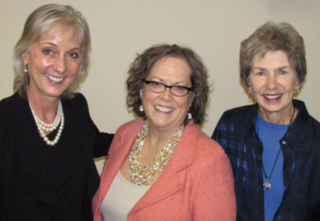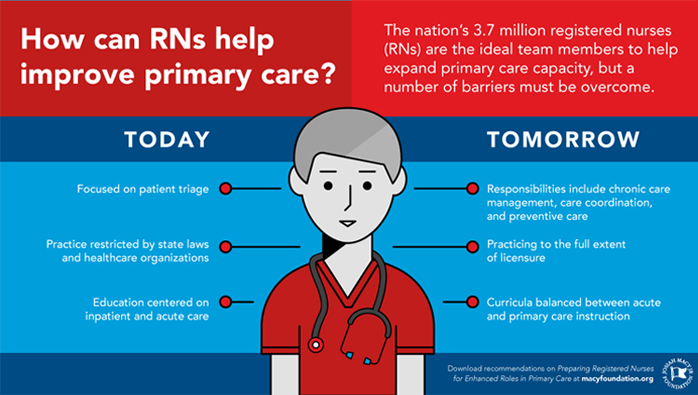
The CAIPER Blog
Catalyzing Change: Maximizing Registered Nurse Scope of Practice in Interprofessional Primary Care

October 11, 2017
By Margaret Calacci and Aliria Rascón
The American health system is transitioning from an illness care model to a patient centered/community-based prevention and wellness system. This care transformation is the direct result of stressors placed on an overburdened system including an aging and sicker population, lack of preventative care, millions of uninsured individuals, shortage of primary care providers, and rising health care costs.
Nurse educators are charged with educating and preparing the next generation of registered nurses with the knowledge, skills and attitudes essential to optimizing team-based care and interprofessional practice essential to this care transformation. Within this scope registered nurses will collaborate with other health care team members to: coordinate care across the continuum of care settings, focus on disease prevention and health promotion, increase access to health care, and ensure the delivery of patient-centered chronic care management.
A visiting scholar to catalyze change
The release of a Josiah Macy Jr. Foundation report and its call to action addressing the interprofessional role of registered nurses in primary care settings and the 2017 Mary Killeen Visiting Scholar for Educational Excellence Honoree, Diana Mason (pictured below with Dean Teri Pipe on left and Dr. Mary Killeen on right) served as a catalyst for our actions.

Dr. Mason was selected as the 2017 Mary Killeen Visiting Scholar for Educational Excellence to share an overview and facilitate dialogue among College of Nursing and Health Innovation (CONHI) faculty and community nurse leaders about the recommendations from Registered Nurses: Partners in Transforming Primary Care, an important topic for dialogue. Dr. Mason was co-chair of the Josiah Macy Jr. Foundation workgroup formulating these published recommendations.
Dr. Mason described how nationally, registered nurses are increasingly engaged in primary care practices as an integral part of the interprofessional team. A primary care office utilizing a registered nurse to assess, teach and coordinate care can significantly increase the number of patients a physician or nurse practitioner can see in a day.
New thinking to educate students, and ourselves
As nurse educators, we need to alter our thinking, teaching strategies and care settings for educating our students. This includes augmenting student experiences in traditional acute care settings with increased learning opportunities in home and community settings and in providing care coordination between settings.
As a result of our expanded thinking, we became determined to be catalysts for changing the conversation. We accomplished this through enhanced strategies for role modeling, discussing the complexity of primary care settings, and the impact registered nurse graduates can make in this expanding field.

In order to position ourselves to influence curricular change, we educated ourselves about current practices and successful practice partners by conducting a the review of literature. Through our innovative design, and with the support of the ASU College of Nursing and Health Innovation (CONHI), we reimagined a tiered approach to effect curricular change. Our plan has the added benefit of being cost neutral.
Stories from the field to start discussions
First, we created an opportunity to discuss the complexity in forming health promotion through primary care practice by hosting a Student Nurse Association (SNA) event open to all ASU student nurses. The ASU CONHI SNA is a school chapter of the National Student Nurses’ Association (NSNA) and the Student Nurses’ Association of Arizona (SNAAz).
During the ASU CONHI SNA event, Marissa Encina, MSN, RN and Michelle Wilson, MSN, RN shared personal experiences in primary care that described the roles, responsibilities and day-to-day life of the primary care RN at the Phoenix Veterans Administration Health System (PVAHS). They discussed personal stories in the context of advantages of working in primary care, such as working at the top of one’s license, fostering patient relationships, practicing complex care coordination and critical thinking, as well as and many other characteristics of a registered nurses’ practice in primary care.
Partnering for alternative education settings
Second, we plan to use CONHI’s existing practice partnerships, such as with the PVAHS, to mentor Transition to Practice students by providing alternative educational settings in the Patient Aligned Care Team/Telehealth (PACT). We established protocols in the Academic PACT GOLD Clinic at PVAHS that we hope will translate to additional regional providers.
In these alternative educational settings students will:
- Complete pre-primary care experience work involving review of nursing competencies for primary care,
- Actively engage in classroom assessment learning techniques (e.g., ticket-in questions).
- Complete an eight-hour shift in primary care, which will include four hours in the Academic PACT (GOLD Clinic), and four hours of additional interprofessional education (IPE) opportunities.
- Engage in specific activities that require interprofessional collaboration during their primary care rotation.
- Reflect on their experience and how the skills observed and practiced in the primary care setting relate to their current immersion/readiness for practice.
Innovating new curricula
A critical step in effecting real change to the education and experience our nursing students receive, is to transition course content in the new plan of study by incorporating primary care into didactic and experiential courses using interprofessional team examples and simulations. We will accomplish with through our collaboration with faculty, the CONHI Academic Innovation, and the faculty and staff of the Simulations Learning Resources.
The Academic Innovation team at CONHI is made up of experts that work collaboratively to transform teaching and learning processes. The team is a unique resource with experience in creating and transforming curricula to emphasize interprofessional teamwork skills.
The expert faculty and staff of the Simulation Learning Resources promote evidence based experiential learning environments. Through simulation and deliberate practice learning activities student’s complete assessments, exercise clinical decision-making skills, and provide interventions in realistic healthcare settings. These experiences are based on specific learning objectives with guided preparation and reflection, to reinforce student self-discovery and learning outcomes.
Here is a selection of four nursing course changes that are being made:
Course 1: Adding an example using a case based on one of the Humans of SHOW clinic patients.
Course 2: Including a simulated primary care visit with Olivia Buffington as a standardized patient encounter.
Course 3: Adding a care coordination simulation of a primary care nurse prioritizing care for a panel of chronically ill diabetic patients.
Course 4: Adding a seminar to explore more opportunities in local community organizations.
Through this tiered approached we hope to inspire faculty and student minds to the possibility of increased autonomy of registered nurses who practice to their full potential in interprofessional primary care.
The Mary Killeen Visiting Scholar for Educational Excellence Program hosts visiting scholars who are experts in educational excellence and who celebrate the transformational power of post-secondary education. Honorees motivate students and faculty to achieve more than they imagined and recognize the range of talents each brings to learning and nursing. They tap the synergy of team and collaboration to empower others and advocate for nursing and nursing education’s future.
Connect with CAIPER
Follow us on Twitter, Facebook, Instagram and LinkedIn for the latest in research, projects and IPE initiatives. Subscribe to our newsletter to be the first to know as we add more trainings and resources!